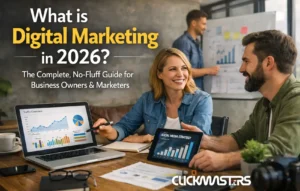Social media marketing plays a crucial role in off-page SEO by enhancing your website’s authority, driving traffic, and increasing engagement. While traditional SEO practices mainly focus on optimizing elements within your website (on-page SEO), off-page SEO focuses on strategies that take place outside your site, such as building backlinks, and social signals, and improving brand recognition. In this article, we’ll dive deep into the role of social media marketing in improving your off-page SEO and how it contributes to better rankings on search engines like Google.

How Social Media Marketing Influences Off-Page SEO
Social media marketing for off-page SEO plays a powerful role in influencing various factors that impact your search engine rankings. Here’s a breakdown of how social media marketing can contribute to your SEO efforts:
Increasing Website Traffic
The more engaging your content is on social media, the higher the chances of driving traffic to your website. Social media platforms like Facebook, Twitter, Instagram, and LinkedIn offer an excellent opportunity to share content and direct users to your site. Increased website traffic signals to Google that your content is valuable and relevant, which can improve your site’s rankings.
Boosting Backlinks
One of the most significant ways social media marketing for off-page SEO impacts your website is through the generation of backlinks. While social media shares themselves are not counted as backlinks by Google, they increase the visibility of your content. When your posts gain traction, they are more likely to be shared by influencers, bloggers, or media outlets, resulting in valuable backlinks to your website. Quality backlinks from reputable sources are a key ranking factor for Google.
Enhancing Social Signals
While Google has never confirmed that social signals (such as likes, shares, and comments) directly impact rankings, there is a clear correlation between high social media engagement and improved search rankings. When your content gets shared and liked on social media, it generates a buzz that can increase the likelihood of backlinks and more traffic. The more social interaction your content receives, the more likely it is to be perceived as relevant and authoritative.
Building Brand Authority and Trust
A strong and active social media presence helps build brand authority. As you engage with your audience and share valuable content, your brand’s credibility and trustworthiness increase. Google values trustworthy websites, and a positive brand image on social media can contribute to improving your site’s reputation in the eyes of search engines.
Encouraging Viral Content
One of the most significant benefits of social media marketing for off-page SEO is the potential for content to go viral. Viral content can reach a vast audience, generating significant traffic and social shares. As content goes viral, it may attract backlinks from other reputable websites, further boosting your SEO efforts. Viral content often leads to increased engagement, brand awareness, and valuable backlinks, all of which contribute to better rankings.
Local SEO Benefits
For businesses focusing on local search, social media marketing is especially beneficial. Platforms like Google My Business, Facebook, and Yelp allow businesses to engage with local customers and share location-specific content. Positive reviews and interactions on these platforms can enhance your local SEO efforts by improving your chances of ranking in local search results.
Best Practices for Using Social Media to Improve Off-Page SEO
To maximize the impact of social media marketing for off-page SEO, it’s important to follow certain best practices. Here are some tips to help you effectively leverage social media for your off-page SEO strategy:
1. Create Shareable and Engaging Content
Content is at the heart of any successful social media strategy. To drive traffic and improve off-page SEO, you must create high-quality, shareable content. Whether it’s blog posts, videos, infographics, or other forms of media, ensure that your content resonates with your audience. The more people share and interact with your content, the more traffic and visibility you’ll generate, contributing to your overall SEO.
Engage with Your Audience
Social media is not just about posting content but also about engaging with your audience. Respond to comments, ask questions, and participate in conversations. Engaging with your audience helps build trust and strengthens your brand’s reputation, which indirectly improves your off-page SEO. Active social media engagement signals to Google that your brand is credible and valuable.
Optimize Your Social Media Profiles
Make sure your social media profiles are fully optimized with relevant keywords, clear descriptions, and links back to your website. Optimized profiles not only improve your visibility on social platforms but also help establish credibility, which can benefit your off-page SEO. Consistent branding across all your social media channels also helps reinforce your authority in your niche.
Collaborate with Influencers
Influencer marketing is a powerful strategy to boost your social media reach and enhance your off-page SEO. Partnering with influencers in your niche can help you gain exposure to a broader audience. Influencers can share your content with their followers, generating traffic and potentially valuable backlinks to your website, which positively impacts your SEO.
Leverage Paid Social Media Campaigns
Paid social media advertising can complement your organic efforts by driving targeted traffic to your website. Ads allow you to reach a specific audience and boost engagement. Although paid ads don’t directly affect your rankings, they can increase your website’s traffic, engagement, and backlink opportunities, all of which have a positive indirect impact on off-page SEO.
Add Social Sharing Buttons to Your Website
Make it easy for visitors to share your content by adding social media sharing buttons on your blog posts and other pages. The more people share your content on their social media profiles, the more exposure your content will receive. This increased exposure can lead to more backlinks, traffic, and social signals, which are all beneficial for off-page SEO.
Conclusion
Social media marketing for off-page SEO plays an important role in boosting your website’s authority, driving traffic, and generating backlinks, all of which contribute to better rankings on search engines like Google. While social signals may not directly affect rankings, the indirect impact of increased traffic, backlinks, and brand authority cannot be overlooked. By using the best practices outlined in this article, you can effectively leverage social media to enhance your off-page SEO strategy and improve your site’s visibility in search engine results.
FAQs
How can social media contribute to off-page SEO?
Social media contributes to off-page SEO by driving traffic to your website and increasing its visibility. While social signals (likes, shares, comments) don’t directly affect search rankings, social media engagement often leads to backlinks from other websites. Increased shares and interactions also help improve brand authority, indirectly boosting your site’s SEO.
What is the role of SEO in social media marketing?
SEO plays a crucial role in social media marketing by helping your content get discovered and ranked higher in search engine results. By using relevant keywords, optimizing your social media profiles, and creating shareable content, SEO ensures that your social media posts reach a broader audience. Additionally, optimized profiles and posts can drive traffic back to your website, benefiting off-page SEO.
How can social media help SEO?
Social media can help SEO by amplifying your content’s reach, driving traffic to your website, and generating backlinks. While social media signals don’t directly influence rankings, increased exposure can lead to higher chances of acquiring backlinks from other reputable websites. More traffic and engagement on social platforms can also signal relevance and authority to search engines.









